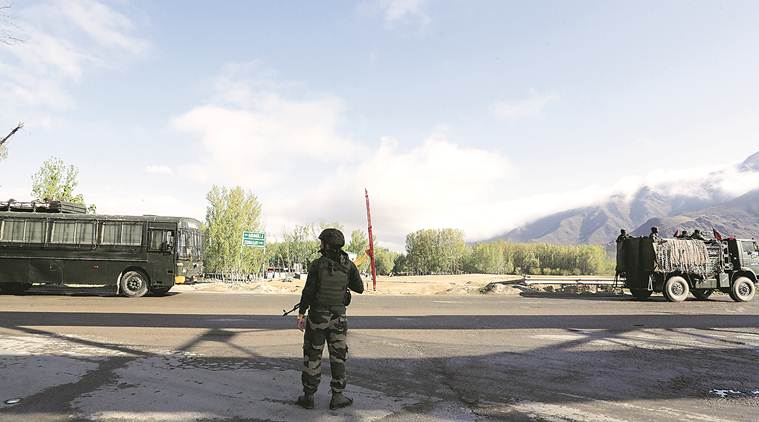
Despite repeated claims by top political leaders that India is intent on safeguarding the Kashmiri people, the ground realities now reflect a total siege with restrictions on all freedoms, including the freedom of movement. This unfreedom, more than containing the pro-azadi sentiment, has further alienated the population of Kashmir, Chenab Valley and Pir Panjal region of Jammu and Kashmir.
Over the past few years, there has been a consistent effort to brand every Kashmiri a terrorist through a carefully-crafted campaign by Hindutva groups who ignorantly see a forcible demographic change — dismantling the Muslim-majority character of J&K — as the only solution. This dangerous mindset has gained official patronage and a boost from certain television anchors who misrepresent and spread venom against the Muslims of J&K for petty gains: Naturally, this hostility isn’t limited to the fringe right-wing groups.
The recent restriction on the use of the national highway — the most important road link in the state — by the people is the latest manifestation of the Centre’s hegemonic approach. This measure, too, can only be understood in the context of larger and widespread approval to harsh treatment of Muslims of J&K, particularly Kashmiris. The latest ban, of course, isn’t the first instance of deprivation of Kashmiris at the hands of jingoistic decrees; overpowering us has been a constant strategy.
The current phase of the conflict in J&K was triggered by the Amarnath land row, which was followed by an economic blockade of Kashmir when the adherents of Hindutva assembled in Jammu and shut down the national highway. Those who defied the government in 2008 and forcibly blocked the highway are now ruling both the state and the country. That’s why it is an official act this time.
The subjugation in Kashmir has become personal and the reactions, whether in terms of militancy or stone pelting or protests, too, are an outcome of individual experiences of the larger political climate. The consequences have been predictable — the fissures have only widened. These fissures are dangerous to the very idea of India that places Jammu and Kashmir, its only Muslim-majority state, as an emblem of its secular credentials.
Hostilities towards minorities have dangerously increased in the recent years and have become more common, personal and discriminatory. It would be pertinent then to pause for an introspection: If spewing venom against Muslims, lynching them for what they eat, banning their roadway access to the mainland, vituperating them for how they look or pray can secure votes for a political party and ensure its victory, how true is the nation towards its own idea of a secular state? If India doesn’t have a respectable position for its Muslims, then why does this country even want a Muslim-majority state in the Union?
The ruling class must realise that actions like the blocking of the national highway only reinforce the Kashmiri belief that Kashmir is maintained only to be fed into the incinerator of campaign speeches and vote-seeking across the country: Each time depleting the faith that Kashmiris have in the Delhi elite. The blocking of the national highway is a blatant dismissal of years of investment in reconciliation, aimed to reduce conflict between the people and security forces. By pitting the public against the security forces, the government has further estranged the population that it should, ideally, be engaging with. The security forces that should provide people a sense of security have become the main cause of insecurity and inconvenience for the people because of the myopic policies of the political elite.
Many questions arise about the motives behind this policy when one realises that, if army and security force convoys are safe in sharing the highway with the public for five days, why ban public use for two days? Meanwhile, the tactical specific schedules of security convoys will endanger soldiers more than mixed traffic, by making movements predictable and official. So, ironically, by making public the schedule of movements of the security convoys, the government itself has jeopardised the safety of the security forces.
Generalising threats and fear, reducing democracy to token elections — and elections to a security drill, inconveniencing tax-payers for securing convoys, and, disproportional and misdirected counter-reaction to every attack, may not embody the democratic ideals that India professes to adhere to: Instead, it represents the novel solutions that have been proposed for the Kashmir issue. This is a glaring contradiction, and there are many others. For example, in removing the security of the mainstream politicians in Kashmir, the state has risked the same people who have been the custodians of the mainstream political space in Kashmir for seven decades. To all the questions of dissent and resentment in the Valley, Delhi’s response earlier was democracy. Now it is more about securitisation.
It is also relevant to question that if mainstream parties in the state — that have traditionally won more than two-third majority together in consecutive elections — have no say in the matters concerning their people, cannot put forth facts about the foundations of J&K’s constitutional relationship with the Union, and, are dismissed as anti-nationals, then who is a patriot in Kashmir?
When the world is focused on connectivity, we are unfortunately blocking our own ways to our own people, and then celebrating this disconnect in the name of territorial control. If policies are framed as tools for revenge, if law enforcement agencies are used as weapons against ideological and electoral opponents, democracy can’t survive.
The writer is youth president of the PDP